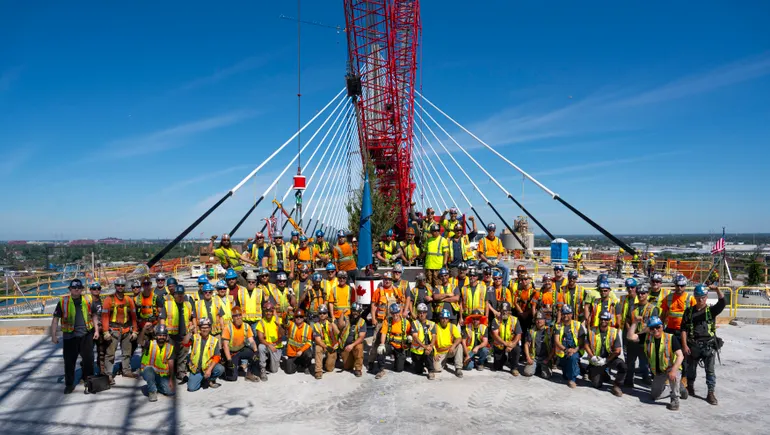Fluor reported three months ago that clients were forging ahead with projects despite trade headwinds. Now, many are hitting pause, the company said on its Friday second quarter earnings call.
“Over the past couple of months, we’ve seen more clients continue to take a wait-and-see approach due to a variety of reasons, including ongoing trade policy discussions and developments, cost escalation and interest rates,” said Fluor CEO Jim Breuer during the call. “In a few cases, we’ve seen project cancellations or extended deferments.”
In Friday morning trading, the company’s stock cratered more than 27% following the news.
Meanwhile, a trio of older infrastructure jobs continues to hamstring Fluor’s earnings, said Breuer.
In its Urban Solutions segment, which focuses on infrastructure, advanced facilities and life sciences, second quarter profits nosedived from $105 million in the prior year period to $29 million. The hit came largely from cost overruns on the Gordie Howe International Bridge between Windsor, Ontario, and Detroit, and the LBJ 635 expansion and I-35 Phase 2, both in Dallas.
All three jobs are now more than halfway complete. Breuer said the Gordie Howe project is now 97% finished, LBJ 635 is 78% done and I-35 Phase 2 is 58% built. He added the company will be taking legal action against certain subcontractors for poor performance on the jobs.
“Whether it’s design errors by third parties or material escalation or labor challenges, we are addressing very aggressively these issues, and have taken actions both on the execution front and on the recovery from third parties,” said Breuer. “It is true that unfortunately, we are still experiencing some pain from projects.”
Hits to energy
Work tied to energy construction also slowed.
The firm’s Energy Solutions segment profit dropped about 80% to $15 million from $75 million a year ago, according to the earnings report. The company cited reduced capital expenditures in the battery and chemicals market and a $31 million arbitration ruling tied to a fabrication project by its Mexico joint venture in 2021.
“As far as the trade policy topic, it is having a significant impact on client sentiment and their willingness to make long term decisions, investment decisions,” said Breuer. “What our clients are looking for is a little more stability and certainty around where that’s going to go.”
Despite those setbacks, executives on the call touted positive milestones on other jobs, including new progress on semiconductor work. Other highlights include early engineering for a rare earth project in Wyoming and two completed co-location data center projects in India. Fluor execs also pointed to nuclear energy as a key growth area.
Jim Breuer
Courtesy of Fluor
Breuer also said Fluor remains confident around demand for infrastructure and power-related work over the next several quarters, particularly as federal policy incentives begin to take effect.
“We are at a point in the cycle of short term hesitation on our way to longer term opportunities,” said Breuer. “Specifically in the U.S., once the effects of the recently enacted pro-growth policies materialize, we expect clients to accelerate domestic investment in many of our end markets, such as manufacturing, semiconductors, data centers, power, mining, metals and national security.”
Q2 results
Fluor reported it earned $2.5 billion in the second quarter of 2025, up from $169 million in 2024, driven by $3.2 billion pre-tax mark-to-market gains on its investment in NuScale, a small modular nuclear reactor company, according to the release. Its revenue reached $4 billion in the second quarter, about a 6% drop year over year.
Backlog fell to $28.2 billion in the second quarter, a 13% drop from $32.3 billion a year ago, according to the earnings report. New awards also dropped 43% year-over-year to $1.8 billion for the second quarter.
“[Results] were tough with weak orders, charges and delays all peppering the report,” wrote Andrew Wittmann, senior research analyst at Baird, a Milwaukee-based financial services company, in a research note. “Ultimately, [partial NuScale] monetization was good … results were not.”
View the original article and our Inspiration here


Leave a Reply